Podcast Topic: Community & Economic Development
The Leading Voices in Food
Podcast Topic: Community & Economic Development
 E268: Why Corporate Control of Agriculture is Cause for Concern
E268: Why Corporate Control of Agriculture is Cause for Concern
March 26, 2025
How big is too big? When it comes to corporate concentration many observers raise concerns about the tech industry. However, in the new book, Titans of Industrial Agriculture: how a few giant corporations came to dominate the farm sector and why it matters, political economist Jennifer Clapp draws attention to the overwhelming shadow a small handful of transnational corporations cast over the global agricultural sector. Professor Clapp argues that these corporations hold concentrated power over the agricultural sector that keep industrial agricultural practices entrenched in patterns of production, despite the concerns of the social, ecological and health impacts to society. She explains how we got to this point and what it might take to make changes. Jennifer’s work at the intersection of the global economy, food security, and food systems, and the natural environment, looks specifically at issues of global governance. She is currently a member of the International Panel of Experts on Sustainable Food Systems, and a member of the Scientific Advisory Committee of the UN Food Systems Coordination Hub.
Related podcasts: Agriculture & Tech | Climate Change, Environment & Food | Community & Economic Development | Economics of the food system | Food Industry Behavior & Marketing | History & Food | International Food & Ag Policy |
 E267: Nzatu uses bees and ancient grains to uplift African farmers
E267: Nzatu uses bees and ancient grains to uplift African farmers
March 24, 2025
The climate crisis is devastating the ability of African farmers to support themselves and their communities. Farmers struggle with a lack of running water, electricity, communications, and public transportation. Entire communities are often cut off from the larger world, exacerbating and extending the poverty crisis that grips large parts of the continent. To overcome these issues, our guest, Gwen Jones, co-founded Nzatu Food Group, a regenerative agriculture business designed to protect biodiversity and mitigate climate change. Nzatu Food Group has done some remarkable pioneering work. Gwen is connected to 15,000 Sub-Saharan farmers across 15 countries through beekeeping, sustainable agricultural and conservation training, and by building an increasingly international market for farm products.
Related podcasts: Agriculture & Tech | Climate Change, Environment & Food | Community & Economic Development | Economics of the food system | History & Food | International Food & Ag Policy | Voice of Farming |
 E266: What’s next for school meal quality?
E266: What’s next for school meal quality?
March 13, 2025
The food and nutrition landscape in our schools is really important. School meals affect the health, wellbeing, energy, vitality, and ability to learn for millions and millions of children. And for those whose family struggled to buy food, the importance of school meals cannot be overstated. This makes decisions about what foods are served in schools and where they come from. Highly consequential and raises issues about national and state nutrition policies, the influence of big food companies in shaping this picture and lots more. It’s a good time to unravel all this, which we can do today. Thanks to two experts with us. Dr. Marlene Schwartz is Professor of Human Development and Family Sciences and Director of the Rudd Center for Food Policy health at the University of Connecticut. Mara Fleishman is CEO of the Chef Ann Foundation, where she has been a leader advancing school food change, advocating for scratch cook meals that promote children’s health and for more sustainable food systems.
Related podcasts: Advocacy & Food | Child Development & Nutrition | Childhood Obesity | Community & Economic Development | School Meals | Ultra-processed Food & Additives |
 E264: Citizen engagement in post-Brexit UK food and farming policy
E264: Citizen engagement in post-Brexit UK food and farming policy
February 17, 2025
Today we’re exploring civil society’s efforts to shape the food system and land use in the United Kingdom. Our guest today is Sue Pritchard, Chief Executive of the Food, Farming, and Countryside Commission (FFCC). The deeply grassroots work of the commission brings people together to find practical solutions to climate, nature, and health challenges. The goal is to shape fairer and more sustainable food systems and a just transition for rural communities and the countryside.
Related podcasts: Advocacy & Food | Agriculture & Tech | Climate Change, Environment & Food | Community & Economic Development | Food System Narratives |
 E263: Explore the Daily Table non profit grocery store model
E263: Explore the Daily Table non profit grocery store model
February 5, 2025
Today, we’re going to explore Daily Table, an innovative non profit grocery chain dedicated to providing fresh, convenient, and nutritious food affordable to everyone, even those on the Supplemental Nutrition Assistance Program, or SNAP. In today’s economic climate, where rising food prices are impacting households across the country, the concept of a non profit grocery store seems to fill a real need. Our guest today is Daily Table CEO, Sasha Purpura, a software engineer who spent 15 years in the tech industry and product management and development roles.
Related podcasts: Advocacy & Food | Community & Economic Development | Economics of the food system | Equity, Race & Food Justice | Food Banks, Food Pantries & Soup Kitchens | Food Insecurity | Philanthropy & Food Systems |
 E253: Learnings from No Kid Hungry in New York
E253: Learnings from No Kid Hungry in New York
October 29, 2024
When we talk about problems with food insecurity and the food system, we tend to reference challenges at the national or international level. And of course, work at that level really needs to be done. But increasingly, there is a unique focus on regional food system strategies and right sizing solutions to best fit those unique characteristics of a particular locale. In today’s podcast, we will talk with Rachel Sabella, director of No Kid Hungry New York. She leads the planning, implementation, and evaluation of the No Kid Hungry campaigns across the state of New York.
Related podcasts: Child Development & Nutrition | Community & Economic Development | Equity, Race & Food Justice | Food Policy |
 E250: Roots of Change – Successful, incentive-based food and farm policy advocacy
E250: Roots of Change – Successful, incentive-based food and farm policy advocacy
October 8, 2024
Join Kelly Brownell in a conversation with Michael Dimock, Executive Director of Roots of Change, about transforming food systems through innovative policies. Discover how Roots of Change collaborates with various stakeholders to create nutrition incentive programs and support sustainable agriculture, focusing on community-first approaches. Learn about pioneering projects, insights into policy influence, and the future of agricultural practices. This episode provides an optimistic view of the evolving food system landscape and the potential for significant positive change.
Related podcasts: Advocacy & Food | Climate Change, Environment & Food | Community & Economic Development | Equity, Race & Food Justice | Food Policy | Regenerative Agriculture |
 E248: Climate-smart strategies for small-scale fishing communities
E248: Climate-smart strategies for small-scale fishing communities
September 26, 2024
Join host Norbert Wilson and co-host Kerilyn Schewel in the latest episode of the Leading Voices in Food podcast as they dive deep into the world of small-scale fisheries with two distinguished guests: Nicole Franz from the Food and Agriculture Organization of the United Nations (FAO) and John Virdin from Duke University’s Nicholas Institute for Energy, Environment, and Sustainability. Discover the significant role small-scale fisheries play in food security, economic development, and community livelihoods. Learn about the unique challenges these fisheries face, and how community-led climate adaptation alongside top-down national policies can help build resilience. This episode also highlights collaborative efforts between academia and organizations like FAO, painting a comprehensive picture of the state and future of small-scale fisheries.
Related podcasts: Agriculture & Tech | Climate Change, Environment & Food | Community & Economic Development | Fisheries & Food Policy | Food Insecurity | Food Policy | International Food & Ag Policy |
 E247: Cultivating food security and community stability in the Dry Corridor
E247: Cultivating food security and community stability in the Dry Corridor
With food insecurity rising the world over, we cannot escape the reality that climate change is changing our food supply. This means people’s livelihoods and lifestyles are changing too, particularly in developing countries. Join us on the Leading Voices in Food podcast as we discuss the rising impact of climate change on food security and livelihoods in Central America, specifically Honduras. Host Norbert Wilson, Director of the World Food Policy Center, along with co-host Sarah Bermeo, delve into the challenges and solutions with experts Marie-Soleil Turmel from Catholic Relief Services and Ana Andino from Duke University. Learn about the Dry Corridor, the effects of climate shocks, land restoration practices, and the role of international support in building community resilience.
Related podcasts: Agriculture & Tech | Climate Change, Environment & Food | Community & Economic Development | Economics of the food system | International Food & Ag Policy |
 E242: Revamping debt for nature swaps could support resilient food systems
E242: Revamping debt for nature swaps could support resilient food systems
August 21, 2024
In today’s discussion, we will explore the application of debt relief to large investments in environmental sustainability, which can also support local development, including more resilient food systems. This is particularly timely, given the juxtaposition of enormous debt burdens with increasing environmental commitments by developing countries. Debt for relief swaps, such as financial forgiveness for cash strapped countries if they invest those funds to support global environmental goods, have been around since the 1980s. However, they haven’t achieved their full economic or environmental potential, says Duke University Economic and Environmental Policy Professor Alex Pfaff. Smart reforms to improve debt relief programs can allow nations to help themselves and fulfill commitments to preserve the planet. Pfaff and colleagues described needed reforms in a recent analysis in a policy forum for the journal Science, also summarized in Foreign Policy magazine. His co-authors are sustainability expert Elizabeth Losos and conservation professor Stuart Pimm from Duke University. They note that global society has now learned lessons, not only from past debt for nature swaps, but also decades of evaluation of climate change of environmental and development policies.
Related podcasts: Climate Change, Environment & Food | Community & Economic Development | International Food & Ag Policy |

 E268: Why Corporate Control of Agriculture is Cause for Concern
E268: Why Corporate Control of Agriculture is Cause for Concern E267: Nzatu uses bees and ancient grains to uplift African farmers
E267: Nzatu uses bees and ancient grains to uplift African farmers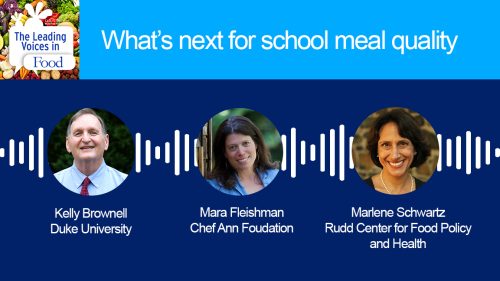 E266: What’s next for school meal quality?
E266: What’s next for school meal quality?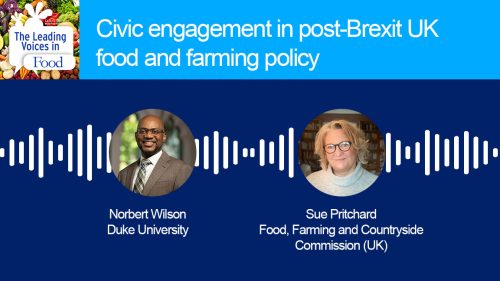 E264: Citizen engagement in post-Brexit UK food and farming policy
E264: Citizen engagement in post-Brexit UK food and farming policy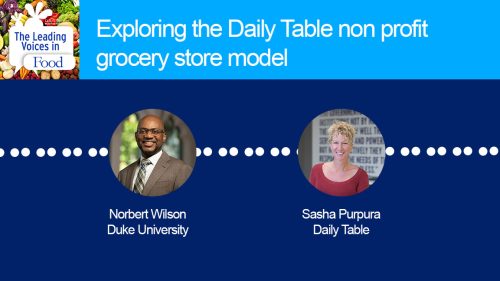 E263: Explore the Daily Table non profit grocery store model
E263: Explore the Daily Table non profit grocery store model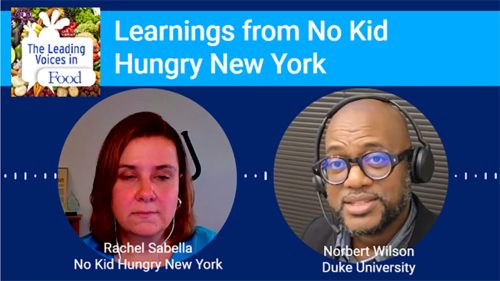 E253: Learnings from No Kid Hungry in New York
E253: Learnings from No Kid Hungry in New York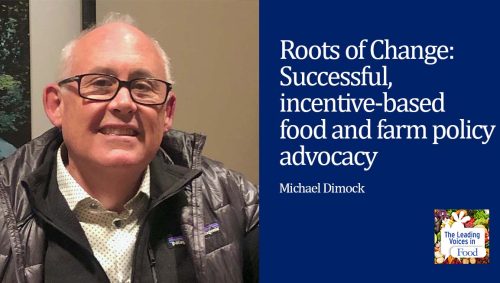 E250: Roots of Change – Successful, incentive-based food and farm policy advocacy
E250: Roots of Change – Successful, incentive-based food and farm policy advocacy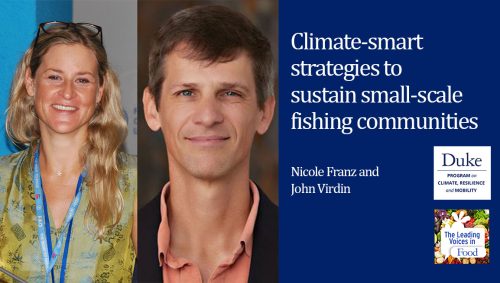 E248: Climate-smart strategies for small-scale fishing communities
E248: Climate-smart strategies for small-scale fishing communities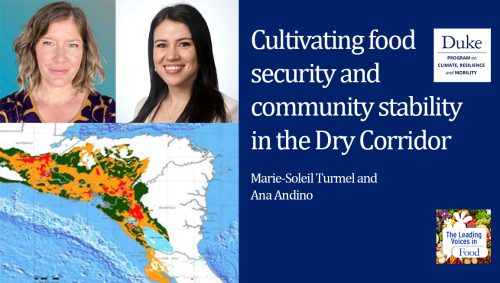 E247: Cultivating food security and community stability in the Dry Corridor
E247: Cultivating food security and community stability in the Dry Corridor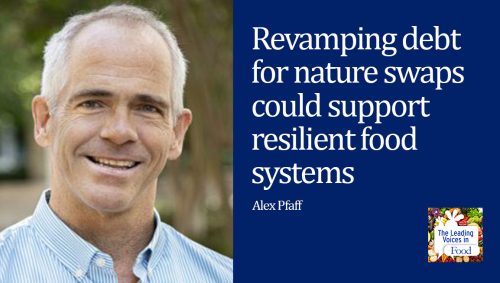 E242: Revamping debt for nature swaps could support resilient food systems
E242: Revamping debt for nature swaps could support resilient food systems